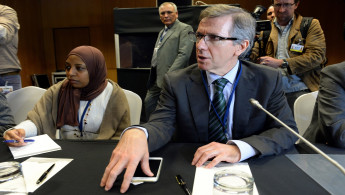Egypt wants spies, not boots, on ground in Libya
Official Egyptian sources have told al-Araby al-Jadeed that Cairo is concerned that any political resolution of the Libyan crisis will ignore the issue of armed groups.
The sources added that Egypt has conveyed its concerns on Libya to Algeria, at a meeting held between the Egyptian foreign minister Sameh Shoukry and the Algerian Minister for Maghreb and African Affairs Abdelkader Messahel in Cairo. The sources said the meeting was also attended by the chief of Egyptian intelligence Minister Khaled Fawzi and his Algerian counterpart Minister Mohammad Bouzayt.
No intervention
At a time when Libya's neighbours with the exception of Egypt have rejected military intervention, the Egyptian regime seems to have started efforts to step up intelligence coordination with some of Libya's neighbours. Egyptian President Abdel Fatah el-Sisi could be trying to circumvent the UN Security Council's opposition to military intervention in Libya, by proposing intelligence cooperation among Libya's neighbours with a view to prop up the Tobruk government and General Khalifa Haftar. According to one Egyptian diplomat, Sisi's aim is to intervene in support of certain parties in the conflict and assert Egypt's opposition to dialogue with militias.
| Despite the coordination between Egypt and Algeria, there is a clear divergence in the two countries' positions concerning military intervention. |
But despite the ongoing coordination between Egypt and Algeria on the Libyan issue, there is a clear divergence in the two countries' positions concerning military intervention in Libyan territory.
Previously, the Algerian Minister of Foreign Affairs Ramtane Lamamra, stressed that Algeria, as Libya's neighbour, was keen to be part of the solution and not part of the problem. Lamamra underscored what he said was the prominent role Libya's two neighbours can play in resolving the crisis there, in reference to his country and Egypt.
Lamamra said "The goal of the negotiations is to allow Libya to form a national unity government as soon as possible."
He had also voiced support for a political settlement in Libya, stressing that time was of the essence, and that it was necessary for all Libyan rivals to make concerted efforts and allow all those with good intentions to help them reach this goal, as he said.
Meanwhile, an Egyptian diplomatic source who asked not to be named told al-Araby "Sisi is trying to impose a fait accompli in his bid to convince Libya's neighbours to endorse Cairo's point of view."
The diplomat added "Sisi wants to intervene in Libya by any means, even if the form of this intervention is not military in nature, through intelligence cooperation with Libya's neighbours in favour of Haftar and his forces."
The diplomatic source continued "The situation in Libya worries Sisi, since the forces in control on the ground are either armed groups or Islamist factions."
The source reckoned that the Egyptian president would not be able to influence the situation in Libya in Haftar's favour, however, arguing that the international community has only accepted a political settlement and is thus pushing for inter-Libyan dialogue.
"Diplomatic meetings do not influence the course of events, but are part of efforts for ongoing cooperation between the Egyptian and Algerian sides, as well as with other neighbours of Libya," he added.
This is an edited translation from our Arabic edition.



